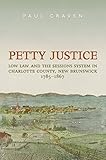Petty Justice : Low Law and the Sessions System in Charlotte County, New Brunswick, 1785-1867 / Paul Craven.
Material type: TextPublisher: Toronto : University of Toronto Press, [2014]Copyright date: ©2014Description: 1 online resource (568 p.) : 11 figuresContent type:
TextPublisher: Toronto : University of Toronto Press, [2014]Copyright date: ©2014Description: 1 online resource (568 p.) : 11 figuresContent type: - 9781442649910
- 9781442621770
- 347.715/33 23
- KEN532 .C73 2014
- online - DeGruyter
| Item type | Current library | Call number | URL | Status | Notes | Barcode | |
|---|---|---|---|---|---|---|---|
 eBook
eBook
|
Biblioteca "Angelicum" Pont. Univ. S.Tommaso d'Aquino Nuvola online | online - DeGruyter (Browse shelf(Opens below)) | Online access | Not for loan (Accesso limitato) | Accesso per gli utenti autorizzati / Access for authorized users | (dgr)9781442621770 |
Frontmatter -- Contents -- List of Figures -- List of Tables -- Foreword -- Preface -- Chapter 1. Introduction: High law, low law, not law -- Part I. Petty justices -- Chapter 2. The trials of David Owen, 1787-1803 -- Chapter 3. High noon at Campobello: St Andrews and the islands in the 1820s -- Chapter 4. The empire strikes back: Executive action, 1824-32 -- Part II. Doing substantial justice -- Chapter 5. In the woods: Low law and the Crown Land Office -- Chapter 6. ‘Unconnected with mercantile pursuits’: The justice business, 1840-1 -- Chapter 7. Hatheway’s civil docket, 1847-67 -- Chapter 8. Hatheway’s crown docket, 1847-67 -- Part III. The sessions system and its enemies -- Chapter 9. Called to account: Justices, assemblymen, and ratepayers -- Chapter 10. Three ships: Poverty, paternalism, and politics atmid-century -- Chapter 11. The temperance magistrates: License and prohibition -- Chapter 12. The sessions system in decline -- Appendices -- Appendix A. Reference tables -- Appendix B. Commission of the Peace, 1845 -- Appendix C. Sources cited -- Bibliography -- Index of Names -- Topical Index -- Backmatter
restricted access online access with authorization star
http://purl.org/coar/access_right/c_16ec
Until the late nineteenth-century, the most common form of local government in rural England and the British Empire was administration by amateur justices of the peace: the sessions system. Petty Justice uses an unusually well-documented example of the colonial sessions system in Loyalist New Brunswick to examine the role of justices of the peace and other front-line low law officials like customs officers and deputy land surveyors in colonial local government.Using the rich archival resources of Charlotte County, Paul Craven discusses issues such as the impact of commercial rivalries on local administration, the role of low law officials in resolving civil and criminal disputes and keeping the peace, their management of public works, social welfare, and liquor regulation, and the efforts of grand juries, high court judges, colonial governors, and elected governments to supervise them. A concluding chapter explains the demise of the sessions system in Charlotte County in the decade of Confederation.
Mode of access: Internet via World Wide Web.
In English.
Description based on online resource; title from PDF title page (publisher's Web site, viewed 01. Dez 2023)


